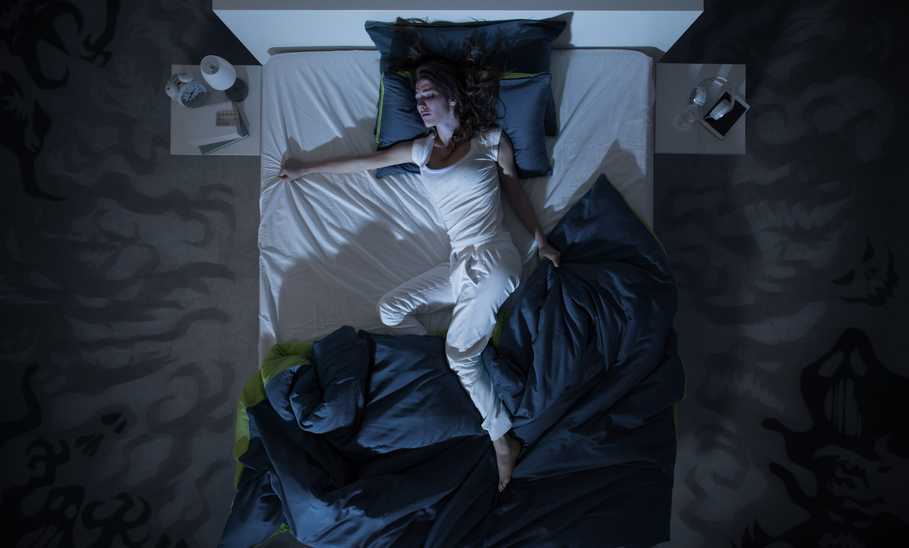Why Do i Sweat In My Sleep and 5 Ways to Combat It


Our evaluations and opinions are not influenced by our advertising relationships, but we may earn a commission from our partners’ links. This content is created by TIME Stamped, under TIME’s direction and produced in accordance with TIME’s editorial guidelines and overseen by TIME’s editorial staff. Learn more about it.
It’s no secret that sleep is important. Getting enough sound sleep every night is one of the cornerstones of physical and mental health. If you’re tossing and turning all night or only spending a few hours tucked in, you’ll be spending your days drowsy and cranky—not to mention the fact that chronic sleep loss has been linked to an increased risk of high blood pressure, diabetes, obesity, depression, heart attack, and stroke.
One thing that may be stopping you from getting the restful sleep you need: sweating. I’m diving into the reasons you may be sweating at night, how to combat them, and when to see a doctor about your disrupted sleep.
Before I get into the possible reasons you may be sweating in your sleep, it’s important to remember that some sweating at night is natural. “Your body has different thermoregulatory states that coincide with different stages of sleep,” explains Michael Smith, PhD, professor of psychiatry and neurology and director of the division of Behavioral Medicine at Johns Hopkins Bayview and co-founder and current President of the Society of Behavioral Sleep Medicine. “In deep sleep, slow wave sleep, you will have more sweating going on. That’s a normal part of going into deep sleep.”
What’s not normal is sweating so much that it’s forcing you awake or otherwise disrupting your ability to achieve restful sleep. Here are some of the reasons that may be happening.
This one is perhaps the most obvious: Your bedroom could be too warm. “You want your room temperature to be usually on the cool side,” says Dr. Smith. “You don’t want to be so cold you’re uncomfortable, but if it’s very hot, that will impact the quality of your sleep.” That’s because your core body temperature needs to drop one to two degrees in order to achieve deep sleep. If you’re starting this process in a room that’s too warm, or you’re under too many blankets, it can prevent your body from reaching that temperature — or result in excessive sweating as your body tries to reach it.
If you’ve heard the term night sweats, you’ve most likely heard it associated with perimenopause and menopause, during which hormonal changes lead to sweating at all hours. “In perimenopause, one of the most common symptoms is night sweats,” affirms Dr. Smith. “It’s a combination of hormones declining that causes vasomotor symptoms.” During perimenopause and menopause, changes in levels of the hormones estrogen and progesterone make it difficult for your body to thermoregulate, which has a major impact on sleep.
“About 50% of women in menopause meet criteria for clinical insomnia, and frequently one of the major drivers of that is the night sweats,” Dr. Smith says.
In addition to women at this phase of life, the hormonal changes that occur during the menstrual cycle and pregnancy can cause night sweating in the same way.
Chronic stress, chronic insomnia, and excess sweating are all closely related. “Patients with insomnia have a degree of hyperarousal—their nervous system is jacked up. Their stress systems are in overdrive,” Dr. Smith explains. “Sweating is controlled in part by the nervous system and that interferes with sleep because it’s an arousal-driven system.”
If you’ve ever experienced stress and anxiety, you’re likely familiar with feeling unable to turn your mind and body off at the end of the day because you’re in a constant state of fight-or-flight. It’s being in this aroused state, this inability to relax, that can cause excessive sweating.
Any medications or substances that can cause activity in the autonomic nervous system, the part that controls sweating, could result in increased sweating at night. “Stimulants, caffeine, and amphetamines could be problematic,” says Dr. Smith.
Other medications that can cause sweating at night include antidepressants, hypoglycemic agents (drugs used to treat low blood sugar with diabetes), methadone, and some hormone therapies.
While excessive sweating can disrupt sleep, it can also be the result of an existing sleep disorder. “All the common ones can be associated with sweating too much during sleep,” Dr. Smith notes. “Insomnia is a big one, restless leg syndrome, narcolepsy. There’s also data that patients with sleep apnea can have sweating, particularly around the neck and chest.”
In this sense, you may be experiencing a self-sustaining cycle of poor sleep, in which a disorder is disrupting your sleep and causing sweating, which is serving to disrupt your sleep further.
In addition to the major causes of sweating at night mentioned above, there are a few other possibilities. They include:
These five simple strategies can help hinder sweating and improve your sleep.
According to the National Sleep Foundation, you should keep your bedroom cool, between 60 and 67 F, depending on where you’re comfortable. This will help your body cool down to the appropriate temperature to achieve deep sleep without excessive sweating.
Depending on the season and the temperature at which you keep your bedroom, you may want to exchange your heavy comforter or flannel pajamas for lighter ones during the warmer months to prevent overheating.
A cooling mattress might help and certainly wouldn’t hurt, says Dr. Smith. Look for one that’s designed with fabrics or materials that wick away heat from the body, or consider a thermoregulated mattress in which you can set it to a specific temperature. Likewise, if your body size makes you more prone to sweating, consider a mattress for heavy people that’s designed specifically to combat the issues that could be disrupting your sleep.

“Create a structure for sleep so the body knows it’s time to wind down,” suggests Dr. Smith. This is particularly helpful for people whose sleep is being disrupted by stress, as it will help your body relax and initiate the cooling down process that needs to happen to prepare for sleep. “We teach [patients] to de-arouse, to associate the bedroom with sleep and not stress response,” adds Dr. Smith. A relaxing routine might involve some yoga or meditation, turning off and putting away phones or other devices, or establishing your bedroom as a dark, cool, and comfortable place exclusively used for sleep.
Hormone replacement therapies in particular can help combat night sweats associated with perimenopause or menopause. These medications stabilize the fluctuating hormones, limiting all the associated symptoms.
Sweating may be just the tip of the iceberg when it comes to disrupted sleep. If things get to a point where they are causing problems in your daily life, you should give your doctor a call. “If you’re feeling excessively sleepy during the day and feel at risk for falling asleep, say, at a red light,” says Dr. Smith, it’s worth looking into.
The same goes for if you start to experience insomnia. “The rule of thumb is if it’s taking you 30 minutes to fall asleep or you have 30 minutes of awake time in the night for three days a week for more than a month, talk to your doctor,” suggests Dr. Smith.
But if you’re waking up damp and still feeling rested and ready to attack the day, don’t sweat it (pun intended). You might just run a little warm.
The information presented here is created by TIME Stamped and overseen by TIME editorial staff. To learn more, see our About Us page.



